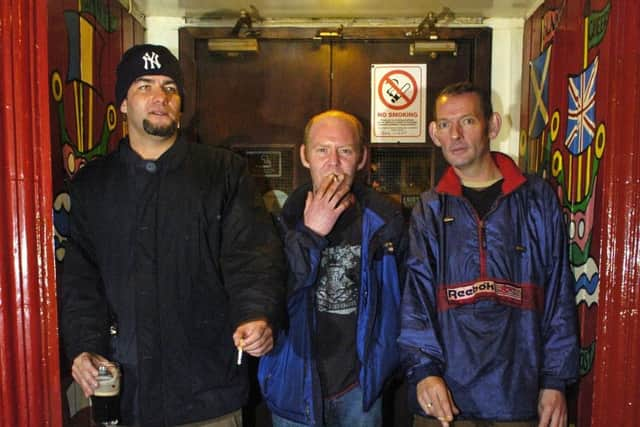Brian Monteith: Scotland has become a failing McNanny state
Speaking of the United States constitution Benjamin Franklin famously said: “In this world nothing can be said to be certain, except death and taxes.” We in Scotland should amend this aphorism to list three certainties, “death, taxes and government strategies”.
There are few things our Scottish Government believes do not deserve a strategy; firstly it shows it cares, then it gives ministers a press release or photo opportunity, and it allows legions of government advisors, private consultants, tax-funded charities and politicised academics to sup from the government’s largesse.
Advertisement
Hide AdAdvertisement
Hide AdThe nature of this business is that no sooner has a strategy been produced than another one is coming down the tracks.Thus we have strategies for culture (I’ve lost count how many under the SNP alone), the economy in general (and especially any politically fashionable aspects of it), for the homeless, for transport, for Gaelic – you name it – such is the regularity of their publication the list seems beyond infinity.


This past week one of the Scottish Government’s most iconic shibboleths, the tobacco control strategy, was published and did not disappoint. If you thought the Scottish Government had run out of ideas to reduce the prevalence of smoking (still a legal pastime for adults, believe it or not) then you would be seriously mistaken. It contained no less than 44 recommended interventions and there were some corkers. It did not take the media newsdesks long to notice in the list there was a commitment to “explore” with local authorities the possibility of changing tenancy agreements of their council houses so that residents would not be allowed to smoke in their own homes. The same goes for housing associations.
Let there be no mistake, despite the weasel words, it is the intention of the Scottish Government to ban smoking in council houses. Period. If they are to meet their target of a “Smoke-Free Scotland by 2034” then it will need to be in place during the next parliament of 2021-25.
Having banned smoking in public places the state is now coming for private spaces too. You might live in a council house and think “Oh well, smokers can always pop outside and have a quick puff in the stairwells or backgreen”. Well that’s already been thought of, because there’s also a proposal to ban smoking in the common areas too. Put the restrictive tenancy agreement and the common areas ban together and you are pushed out onto the pavement or car park.
We are approaching the point when there will be literally no place other than the streets where people can smoke.
This is modern Scotland; this is what I call the McNanny State, and it’s fast on its way to becoming a bully state so that you do as you are told.
Campaigners will find all sorts of justifications to convince us such invasion of privacy is desirable. They will tell you the smoking ban in pubs and elsewhere worked, that it is popular, that health outcomes have improved – and it’s about denormalising smoking in the eyes of our children.
Yet in every example the smoking ban has been a failure, although its adherents will never admit it. Sure, our pubs – fewer in number thanks to the smoking ban – are smoke-free, but instead of denormalising smoking (the stated aim of the ban) it has normalised smoking in the street. Before the ban punters smoked inside the pubs and workers might have smoking rooms – out of sight of kids. Now they can be seen in plain sight of everyone, including children of every age, puffing away and often having a laugh. If ever there was a policy to make smoking look more desirable then the smoking ban was it.
Advertisement
Hide AdAdvertisement
Hide AdThen there are the health claims for the smoking ban that don’t stack up. Whether it’s heart or asthma attacks or lung cancer diagnoses there has been no perceptible fall that can be attributed directly to the ban, and some measurements are actually worse.
Former Scottish Chief Medical Officer, Dr Harry Burns, argued that within 20 years lung cancer would be reduced to just a few hundred cases a year, saying, “Thanks to the smoking ban, I expect the reduction in deaths to accelerate until dying from the disease becomes a rare occurrence.” Ten years after the smoking ban and the incidence of diagnosis has been increasing even though smoking rates have been falling for 40 years.
Maybe the ban was worth it and should be extended because smoking rates have dropped – only the rate actually increased after the ban, and is now falling again in line with the trend across the developed world. The ban cannot be shown to have made any positive contribution to smoking trends.
When it comes to public support that too is unequivocal – but in believing the McNanny State has gone too far. A recent Scottish poll by Populus showed significant public opposition to extending the smoking ban into private homes, private cars without children, beer gardens, hospital grounds and public parks. Indeed the public supports the ban being relaxed to allow ventilated designated areas inside pubs and clubs and for actors on stage.
We live in a time when our politicians are disconnected from the public on many issues, and their desire to dictate our lifestyle choices, good or bad, is one of the most outrageous examples of this. The Tobacco Control Strategy proposes to take the McNanny State into your home like never before. Is there any elected politician or any party out there that will provide the opposition to it?
• Brian Monteith is Editor of ThinkScotland.org